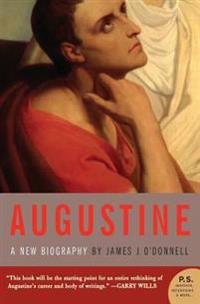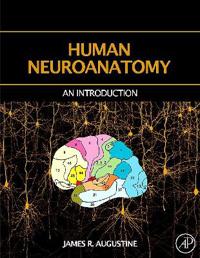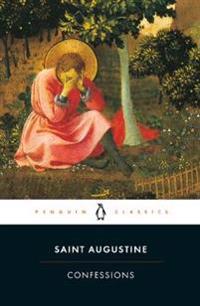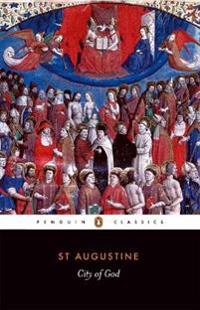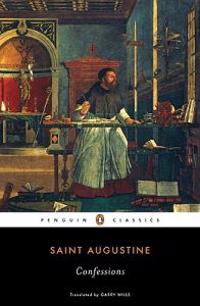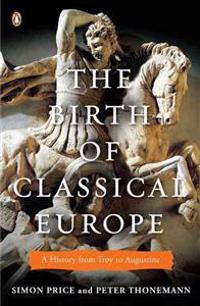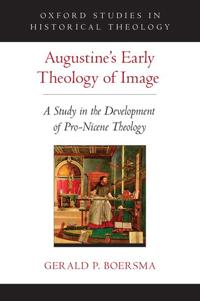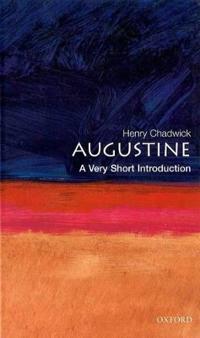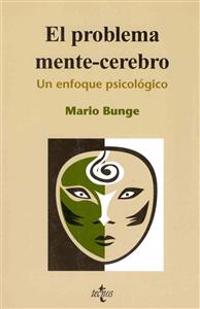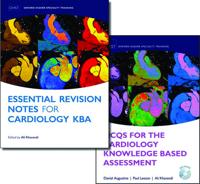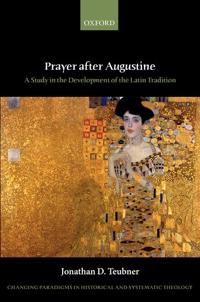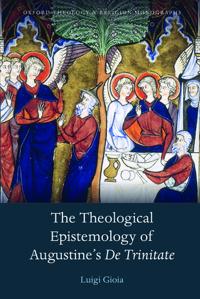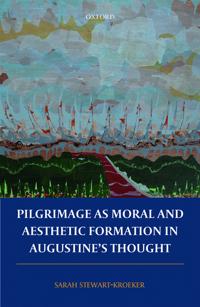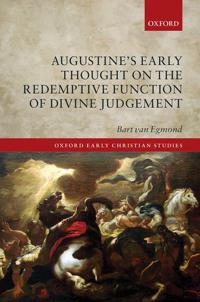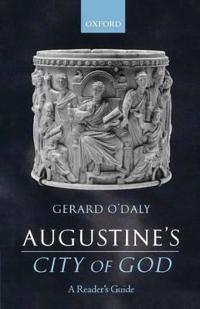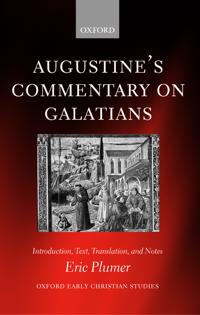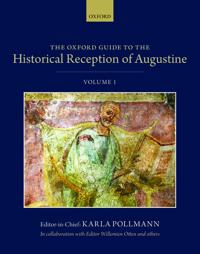Augustine: A New Biography (Häftad)
avJames J. O'Donnell
ISBN: 9780060535384 - UTGIVEN: 200604Saint Augustine -- the celebrated theologian who served as Bishop of Hippo from 396 C.E. until his death in 430 C.E. -- is widely regarded as one of the most influential thinkers in the Western world. His autobiography, Confessions, remains among the most important religious writings in the Christia[...]
Rath & Strong's Six Sigma Advanced Tools Pocket Guide (Pocket)
avAugustine A. Stagliano
ISBN: 9780071434119 - UTGIVEN: 2004-07-30A companion reference to "Rath and Strong's Six Sigma Team Pocket Guide", this book provides instructions for understanding and implementing key Six Sigma tools. It shows your project team leaders and members how to: understand each tool and its Six Sigma application; and select the best tools for c[...]
Human Neuroanatomy (Inbunden)
avJames R. Augustine
ISBN: 9780120682515 - UTGIVEN: 2007-11This textbook provides a thorough and comprehensive overview of the human brain and spinal cord for medical and graduate students as well as residents in the clinical neurosciences. Standing on the shoulders of training from outstanding scientist-teacher mentors and based on more than 30 years of ex[...]
Beyond the Hundredth Meridian: John Wesley Powell and the Second Opening of the West (Häftad)
avWallace Earle Stegner, Bernard Augustine DeVoto
ISBN: 9780140159943 - UTGIVEN: 1992-03In this book Wallace Stegner recounts the sucesses and frustrations of John Wesley Powell, the distinguished ethnologist and geologist who explored the Colorado River, the Grand Canyon, and the homeland of Indian tribes of the American Southwest. A prophet without honor who had a profound understand[...]
Confessions (Storpocket)
avSaint Augustine
ISBN: 9780140441147 - UTGIVEN: 197301The son of a pagan father and a Christian mother, Saint Augustine spent his early years torn between conflicting faiths and world views. His Confessions, written when he was in his forties, recount how, slowly and painfully, he came to turn away from his youthful ideas and licentious lifestyle, to b[...]
City of God (Storpocket)
avSaint Augustine
ISBN: 9780140448948 - UTGIVEN: 200311St Augustine, bishop of Hippo, was one of the central figures in the history of Christianity, and "City of God" is one of his greatest theological works. Written as an eloquent defence of the faith at a time when the Roman Empire was on the brink of collapse, it examines the ancient pagan religions [...]
Confessions of A Sinner (Pocket)
avSaint Augustine
ISBN: 9780141018836 - UTGIVEN: 200409Throughout history, some books have changed the world. They have transformed the way we see ourselves and each other. They have inspired debate, dissent, war and revolution. They have enlightened, outraged, provoked and comforted. They have enriched lives and destroyed them. Now Penguin brings you t[...]
Confessions (Häftad)
avSaint Augustine of Hippo
ISBN: 9780143105701 - UTGIVEN: 200812Garry Wills is an exceptionally gifted translator and one of our finest writers on religion. His bestselling Penguin Lives biography, "Saint Augustine," received widespread and glowing reviews, many of which noted his masterful translations of the famed fourth- century bishop's works. Now, reading w[...]
The Birth of Classical Europe: A History from Troy to Augustine (Häftad)
avSimon Price, Peter Thonemann
ISBN: 9780143120452 - UTGIVEN: 201112A stunning work of research and imagination that sheds new light of the ancient world. The western world has long been fascinated by classical Greek and Roman cultures, whose ideas and achievements underpin our own. Yet little has been written about how those ancient societies existed in conversatio[...]
Augustine's Early Theology of Image
ISBN: 9780190251369 - UTGIVEN: 2016-01The question of what it means for Christ to be the "image of God," or imago dei, lies at the heart of the Christological debates of the fourth century. Is an image a derivation from its source? Are they two separate substances? Does an image serve to reveal its source? Is an image ontologically infe[...]
Augustine (Häftad)
avHenry Chadwick
ISBN: 9780192854520 - UTGIVEN: 200102By his writings, the surviving bulk of which exceeds that of any other ancient author, Augustine came to influence not only his contemporaries but also the West since his time. This Very Short Introduction traces the development of Augustine's thought, discussing his reaction to the thinkers before[...]
Augustine's Invention of the Inner Self: The Legacy of a Christian Platonist (Inbunden)
avPhilip Cary
ISBN: 9780195132069 - UTGIVEN: 2000-06-29Augustine's Invention of the Inner Self (Häftad)
ISBN: 9780195158618 - UTGIVEN: 2003-01In this book, Phillip Cary argues that Augustine invented the concept of the self as a private inner space-a space into which one can enter and in which one can find God. Although it has often been suggested that Augustine in some way inaugurated the Western tradition of inwardness, this is the firs[...]
Beauty and Revelation in the Thought of Saint Augustine (Inbunden)
avCarol Harrison
ISBN: 9780198263425 - UTGIVEN: 1992-08-06Augustine's Way into the Will: The Theological and Philosophical Significance of De Libero Arbitrio (Inbunden)
avSimon Harrison
ISBN: 9780198269847 - UTGIVEN: 2006-11-02MCQs for the Cardiology Knowledge Based Assessment and Essential Revision Notes for the Cardiology KBA Pack (Övrigt)
avDaniel Augustine
ISBN: 9780198704942 - UTGIVEN: 2014-06Essential Revision Notes for the Cardiology KBA and MCQs for the Cardiology Knowledge Based Assessment with DVD are the core texts of revision for this new and compulsory examination. Within Essential Revision Notes for the Cardiology KBA, each chapter maps the core cardiology training curriculum, g[...]
Augustine
ISBN: 9780198752196 - UTGIVEN: 2000-07St. Augustine, the North African bishop of Hippo (AD 354-430), has been much studied. But there has been no systematic attempt to consider the context which shaped his life and thought. Augustine's long and controversial career and his vast literary output provide unrivalled evidence for understandi[...]
Prayer After Augustine
ISBN: 9780198767176 - UTGIVEN: 2018-03The influence of the theology and philosophy of Augustine of Hippo on subsequent Western thought and culture is undisputed. Prayer after Augustine: A Study in the Development of the Latin Tradition argues that the notion of the 'Augustinian tradition' needs to be re-thought; and that already in the [...]
The Theological Epistemology of Augustine's De Trinitate
ISBN: 9780198779209 - UTGIVEN: 2016-08Luigi Gioia provides a fresh description and analysis of Augustine's monumental treatise, De Trinitate, working on a supposition of its unity and its coherence from structural, rhetorical, and theological points of view. The main arguments of the treatise are reviewed first: Scripture and the myster[...]
Pilgrimage As Moral and Aesthetic Formation in Augustine's Thought
ISBN: 9780198804994 - UTGIVEN: 2017-10Augustine's dominant image for the human life is peregrinatio, which signifies at once a journey to the homeland (a pilgrimage) and the condition of exile from the homeland. For Augustine, all human beings are, in the earthly life, exiles from their true homeland: heaven. Only some become pilgrims s[...]
Augustine's Early Thought on the Redemptive Function of Divine Judgement
ISBN: 9780198834922 - UTGIVEN: 2018-12Augustine's Early Thought on the Redemptive Function of Divine Judgement considers the relationship between Augustine's account of God's judgment and his theology of grace in his early works. How does God use his law and the penal consequences of its transgression in the service of his grace, both p[...]
Augustine's City of God (Pocket)
avGerard O'Daly
ISBN: 9780199270811 - UTGIVEN: 2004-04The City of God is the most influential of Augustine's works, which played a decisive role in the formation of the Christian West. This book is the first comprehensive modern guide to it in any language. The City of God's scope embodies cosmology, psychology, political thought, anti-pagan polemic, [...]
Rethinking Augustine's Early Theology: An Argument for Continuity (Inbunden)
avCarol Harrison
ISBN: 9780199281664 - UTGIVEN: 2006-01-19Augustine's Commentary on Galatians (Häftad)
avEric Plumer
ISBN: 9780199297092 - UTGIVEN: 200604Now available in English for the first time, Augustine's Commentary on Galatians is his only complete, formal commentary on any book of the Bible and offers unique insights into his understanding of Paul and of his own task as a biblical interpreter. Yet it is one of his least known works today - an[...]
The Oxford Guide to the Historical Reception of Augustine
ISBN: 9780199299164 - UTGIVEN: 2013-10The Oxford Guide to the Historical Reception of Augustine (OGHRA) is a ground-breaking international and interdisciplinary enterprise on the impact of the thought and work of Augustine of Hippo (AD 354 - 430). Arguably the most influential early Christian thinker in the Western part of the Roman Emp[...]

